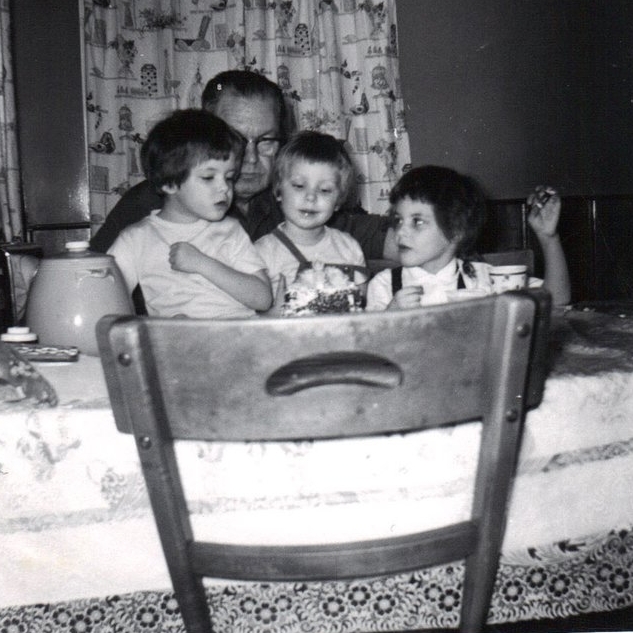The Royal Sisterhood by Lorraine Triggs
The Royal Sisterhood in training. (I am the sweet toddler princess in the middle.)
We were the ruling royalty of South Kenwood Avenue. Granted, our kingdom only extended to one neighborhood block and we were self-crowned. Nonetheless, my sisters and I were benevolent monarchs, gently cajoling our friends to play all games by our rules all the time.
The finest display of our grandeur was reserved for our annual summer backyard play—written, produced and starring ourselves, the Royal Sisterhood. We managed our own promotion, plastering telephone poles with hand-drawn fliers announcing the date, time and place of the performance. And the loyal subjects, uh, neighbors, would come in droves to watch us.
Then one summer we noticed a decline in the number of subjects in attendance. It turned out that a competing kingdom moved in on Dorchester Avenue, one block over from ours. It was ruled by Pamela. The call to arms came when we discovered that she was going to put on a play.
We spent the rest of the summer spying on her. We would climb the old willow tree in the backyard and have a clear view into Pamela's yard. Better yet was our friend "Tuffy" who rermained loyal and lived right next door to Pamela. We would pretend to swim in his above–ground pool, while keeping a watchful eye on her. We neglected our kingdom and our play planning. We sabotaged her publicity and tore off her fliers from telephone poles on Dorchester.
We drove ourselves (and our mother) crazy with this insane need of ours to compare ourselves with Pamela and always come out better than she. No, we didn't want to put on a play with her, the Royal Sisterhood decreed. No, we would rather die than befriend her. No, we were perfectly happy playing this new game of comparison.
Even Jesus' disciples played the comparison game when they "argued with one another about who was the greatest." (See Mark 9:33-37.) When Jesus asked them what they were arguing about, their silence was telling. I know mine would be. Would I really say to Jesus, "Oh, just spying on Pamela to make sure we were still the greatest."
On a lot of levels, I still happily play the comparison game. I don't tear down fliers from telephone poles anymore, but it's hard to avoid comparing homes, children, achievements, social media posts. We even compare how crazy busy we are.
In his book, Saving the Saved, author Bryan Loritts referenced a statement C.S. Lewis wrote in Mere Christianity: "C.S. Lewis was right. In order for pride to exist, there must be comparison with what we would deem to be an inferior other."
The fatal blow to my pride is the recognition that compared to Jesus, I am the inferior other—not Pamela. Any attempt to make myself better than I am will always fall short of his glory. And there, in all my inferiority and other-ness, I recollect the amazingly graced words of Ephesians 2:4-5: "But God, being rich in mercy, because of the great love with which he loved us, even when we were dead in our trespasses, made us alive together with Christ—by grace you have been saved…"
It's time to stop playing my favorite game.


